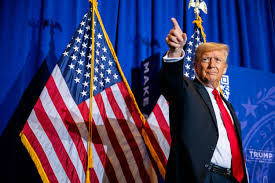As the polls showed Donald Trump was likely to win the US elections, Gerard Araud, French ambassador to Washington and a career diplomat known for his outspokenness, tweeted:
After Brexit and this election everything is now possible. A world is collapsing before our eyes. It resonates eerily with Sir Edward Grey, British Foreign Secretary as war came in 1914: 'The lights are going out all over Europe,' he lamented.
While it would be idiotic to ignore the seriousness of all that has happened this year, it is important not to get carried away like M. Araud. In 2016, the world is not collapsing before our eyes; it is confronted with a challenge not seen in today's great liberal democracies since the 1920s and '30s: fascism.
Fascism - intolerance, bigotry, tribalism - is always present in society because these tendencies are always present in human nature. Two conditions above all are required for fascism to break out on a threatening scale: hardship for substantial numbers of people, and populist leaders who are prepared to cash in on their miseries. Other local grievances will feed the flames: defeat in the Great War in the case of Germany; a divided society resulting from apartheid in South Africa; foreigners coming and taking 'our' jobs in any number of countries.
In France, in Austria, in Holland, with frightening unexpectedness in the UK with the Brexit vote, now in the US, fascism threatens to break out. It threatens to break out, in the view of many, in SA too. The similarities between conditions and role players internationally are too obvious to require underlining.
 However, the fight back by more enlightened leaders and ideas could only start once the threat was there, and the fight has duly started. Two leaders with unenviable jobs if they are to collapse the world are Theresa May and the demonised Donald Trump. The first is not a dictator, the second not the feared anti-Christ; they are voices amid loudly dissenting voices, in for a very challenging time.
However, the fight back by more enlightened leaders and ideas could only start once the threat was there, and the fight has duly started. Two leaders with unenviable jobs if they are to collapse the world are Theresa May and the demonised Donald Trump. The first is not a dictator, the second not the feared anti-Christ; they are voices amid loudly dissenting voices, in for a very challenging time.
Let us keep our feet on the ground. Democracy must plainly accept democratic decisions; it has no alternative. But it must always be on guard against the narrative that lingers from Marxist as well as fascist thinking: that the only way to put the world to rights is through radical 'change' or, more precisely, revolution, a sweeping away of the old 'broken' system and institutions and a 'cleansing' of society. The world has heard and suffered that story before from left and right. None of it had any more truth in it in the past than Trump's promise to make America great again today.
History - if the metaphor is not too trite - is a rolling river that is not to be dammed up nor run into the sands. For those who like a fight, there is a brave one on again, as what Abraham Lincoln called the better angels of our nature strive to turn the present current.
It does not look likely to - and certainly one hopes and prays it does not - take the lives it took in the old century, when a world really did collapse twice before their eyes.






